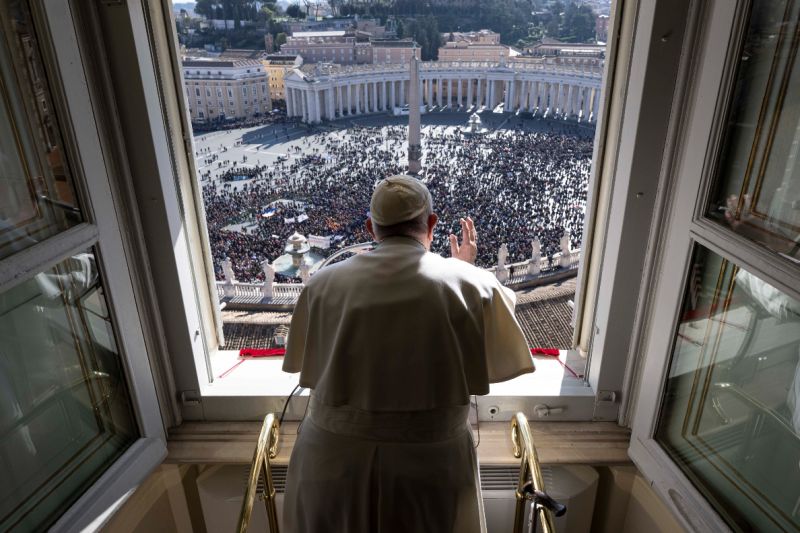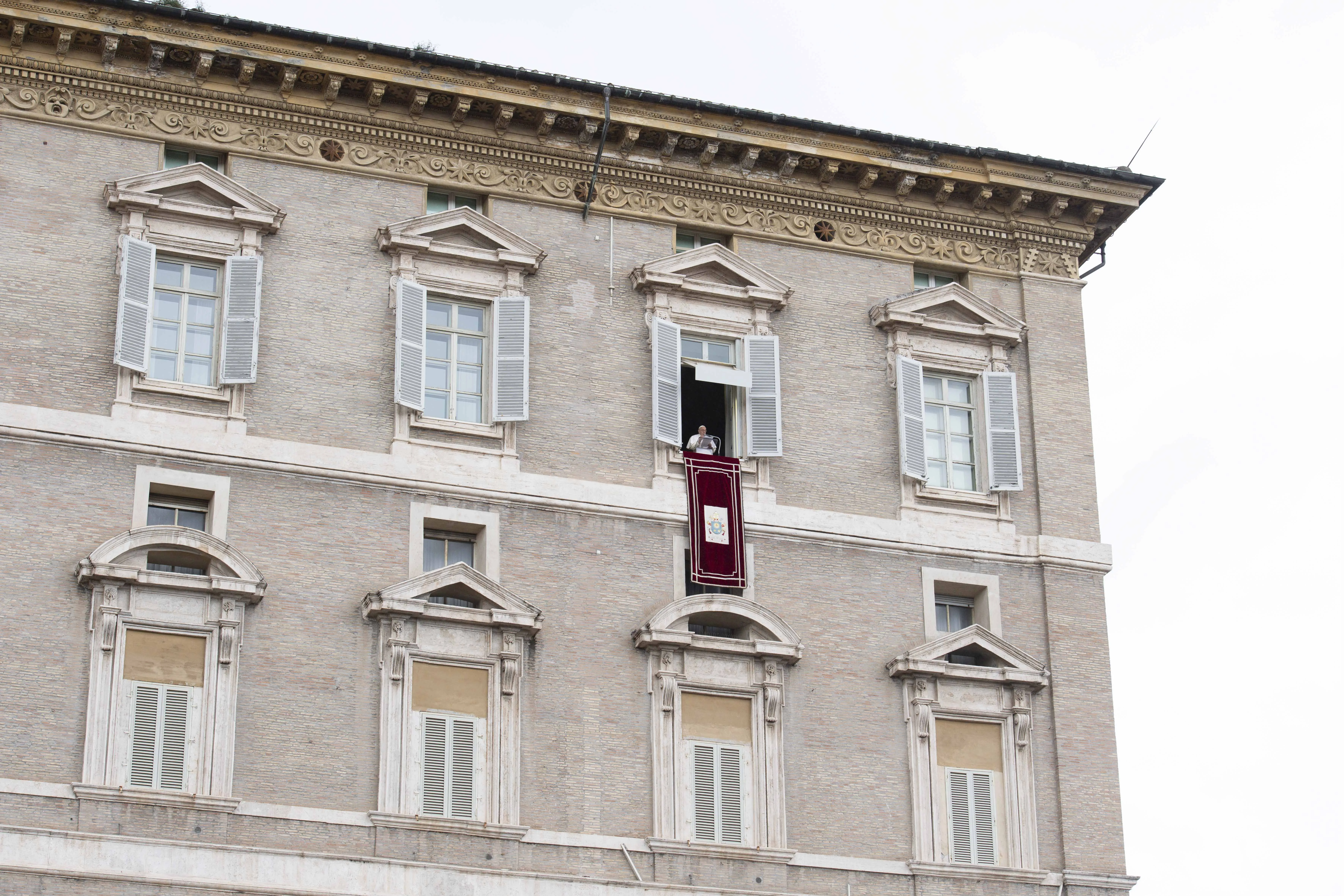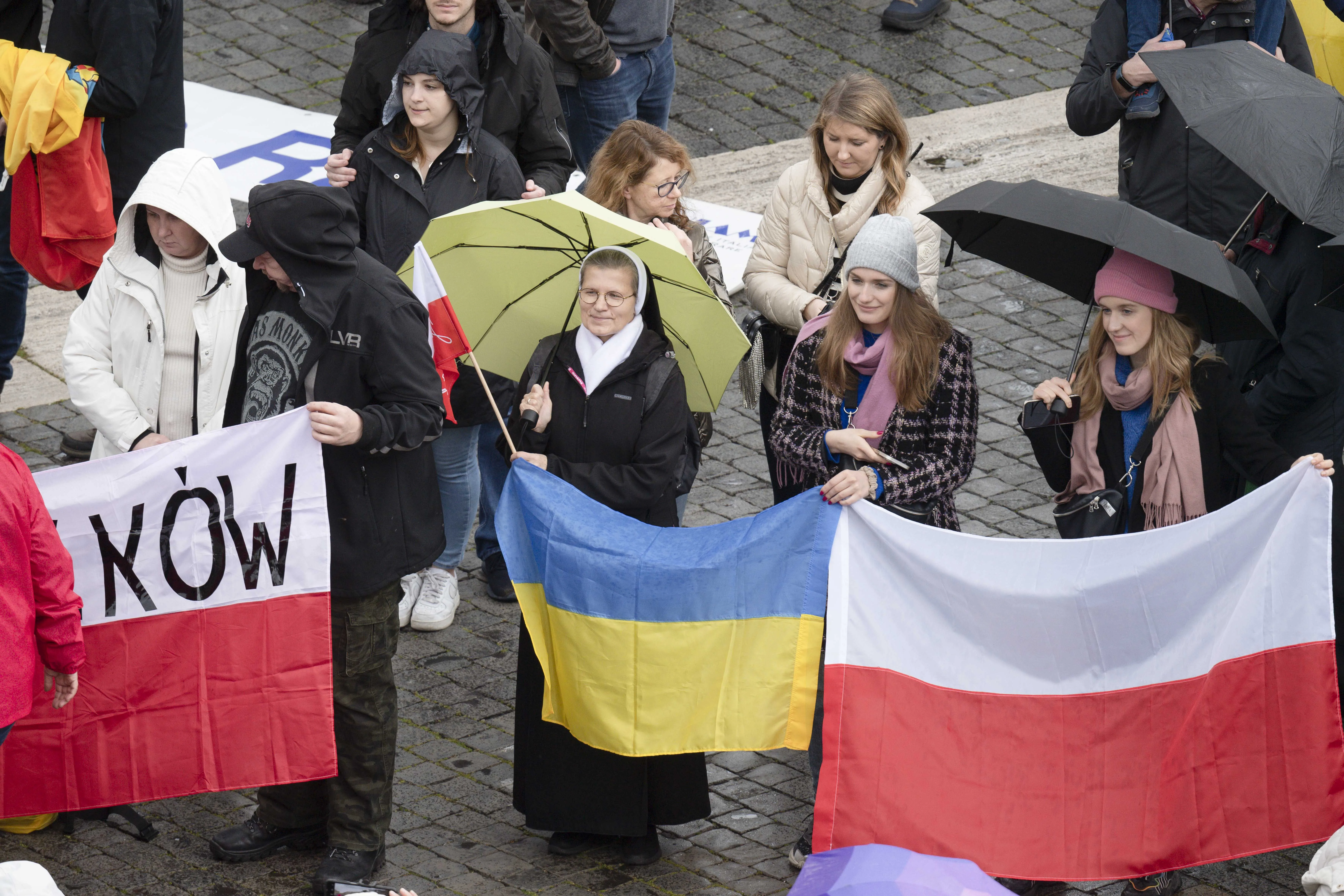
Vatican City, Feb 26, 2023 / 06:15 am (CNA).
On the first Sunday of Lent, Pope Francis warned of three “widespread and dangerous temptations” that the devil uses to separate us from God and divide us from each other.
In his Angelus address on Feb. 26, the pope said that the devil uses three “powerful poisons” to attack and divide Christian communities: attachment to material things, mistrust, and the thirst for power.
“[These] are three widespread and dangerous temptations that the devil uses to divide us from the Father and to make us no longer feel like brothers and sisters among ourselves, to lead us to solitude and desperation. This is what he wanted to do to Jesus and what he wants to do to us, to lead us to despair,” Francis said.

The pope pointed to the Gospel of Matthew to offer advice for how to overcome the three types of temptations, as Jesus did when he was tempted by the devil after 40 days of fasting in the desert.
“Jesus defeats the temptations. But how does he conquer them? By avoiding discussion with the devil and responding with the Word of God,” he said.
Pope Francis explained that Jesus resisted the devil “by opposing him in faith with the Divine Word.”
To counteract the temptations of attachment to material things, mistrust, and the thirst for power, Jesus quotes three phrases from Scripture that speak of freedom from goods, trust, and service to God.
“In this way, Jesus teaches us to defend unity with God and among ourselves from the attacks of the divider,” he said.
The pope encouraged people to turn to the Word of God in their spiritual struggles and in times of temptation.
“If I have a vice or a recurring temptation, why not obtain help by seeking out a verse of the Word of God that responds to that vice?” he said. “Then, when temptation comes, I recite it, I pray it, trusting in the grace of Christ.”
“May Mary, who welcomed the Word of God and with her humility defeated the pride of the divider, accompany us in the spiritual struggle of Lent,” he said.
After Pope Francis prayed the Angelus in Latin with the crowd gathered in St. Peter’s Square, he asked people to pray for the Holy Land, Burkina Faso, Ukraine, Syria, and Turkey.

“Dear brothers and sisters, Painful news is still coming from the Holy Land, where so many people have been killed, even children,” the pope said.
“How to stop this spiral of violence? I renew my call for dialogue to prevail over hatred and revenge, and I pray to God for the Palestinians and Israelis to find the path of fraternity and peace with the help of the international community.”
The pope also said that he was pained to hear on Sunday morning of a migrant boat shipwreck on the coast of southern Italy. At least 43 people died in the shipwreck on Feb. 26 near Steccato di Cutro in Calabria. Eighty people survived, according to Reuters, and the coast guard is still searching for survivors.
“This morning I learned with sorrow of the shipwreck that occurred on the Calabrian coast near Crotone. Already forty dead have been recovered, including many children. I pray for each of them, for the missing, and for the other surviving migrants,” the pope said.
“I thank those who have brought relief and those who are giving shelter. May Our Lady support these brothers and sisters of ours.”
If you value the news and views Catholic World Report provides, please consider donating to support our efforts. Your contribution will help us continue to make CWR available to all readers worldwide for free, without a subscription. Thank you for your generosity!
Click here for more information on donating to CWR. Click here to sign up for our newsletter.




Pope Francis must retract his published idea that “homosexual civil union” can be “legalized” because -as he alleges- homosexualism “is not a crime but a sin”.
Unless and until he does this people will pay a terrible price by dint of the evil presumptions and obstinacies, over and over again -but on account of him.
https://www.catholicnewsagency.com/news/253749/shipwreck-leaves-more-than-50-migrants-dead-in-italy-the-church-expresses-pain
“Again, the devil took him to a very high mountain and showed him all the kingdoms of the world and their splendor; and he said to him, All these I will give you, if you will fall down and worship me. Jesus said to him, Away with you, Satan! for it is written, Worship the Lord your God, and serve only him” (Mt 4: 8-9). Satan then left.
This final temptation implies Satan’s suzerainty over all world authorities. Does it refer to kingdoms at the time, or at any time? Another scenario would be to employ Christ as Satan’s proxy. Assuming in this that Satan was not fully aware of Jesus’ divine nature as well as his human. Whatever might be the case, it would’ve been the ultimate subversion of good.
A distant parallel was Alexander the Great taught the virtues by Aristotle. Alexander employed those virtues to attain power, eventually conquest of the world [east and south of Rome]. Scripture says the world fell silent before him. What extension of authority would have been available to the most virtuous Jesus of Nazareth? Likely unlimited power.
Virtue can be employed for evil. That is the tragic anomaly we have in the Church. How many, from presbyter to pontiff have exercised the form of virtue in their lives and with that gained, seized opportunity to seduce and subvert the innocent? Perhaps the ultimate evil. Using Christ’s gifts for nefarious opportunity. Judas Iscariot possessed those virtues, evident when Christ first chose the Twelve and sent them out to raise the dead, heal the sick, expel demons, and preach the Word.
Judas was chosen. Christ in his divine knowledge knew his betrayer, although similar to the creation and foreknowledge of the Fall that prescient knowledge cannot limit the divine will to carry out good. The betrayer may have become corrupted in time, like so many young, fervent priests who when facing trials and adversity, unexpected temptations of the flesh fall. How many when made bishop? Pontiffs we know are not exempt. How needed are we for the prayers of the faithful? Of our cloistered Sisters? Beyond estimate.
Our present pontiff Francis is aware of this terrible dynamic calling it clericalism. Francis seems to fight the good fight on paper to employ an adage, yet belies words with confounding acts [no need to remind the reader of the litany of contradictory actions]. High authority, in the Church among churchmen the highest authority carries with it immense power. Virtues are evident. As well as application contrary to their ordination.
Got to thinkin’ about the three temptations: (1) material, (2) mistrust, and (3) power.
Yes, but another temptation, even more of a triad, is the ideological periodization of the human substance into three self-sufficient and ascending historical ages:
(1) Ancient,
(2) Middle Ages, and
(3) Modernity–C.S. Lewis’s “chronological snobbery”…
Likewise, the Middle Age theologian Joachim de Fiore’s triadic partitioning of:
(1) the age of the Father (Old Testament),
(2) the age of the Son (until his 13th century), and
(3) the age of the Holy Spirit (beginning in the 21st century, according some agendas).
And then, cutting through the ages, the threefold dismantling of Christ and his Church:
(1) Arianism (the notion that the incarnate Christ is not really divine),
(2) Islam/Protestantism (as cousins, the notion that either Christ is only a prophet foretelling Muhammad; or the succession of other human-founded “ecclesial communities” replacing the sacramental and Apostolic Succession), and
(3) the opposite of Arianism: polyhedral Synodality exaggerated such that Christ is not really human either—as in the obscuring of natural law/moral absolutes (the redefinition of indissoluble marriage, and all of sexual morality reflected in the Catechism and Veritatis Splendor).
In our Apostolic Age, once again, isn’t the mission of real synodality (“communion, participation, mission”) to clearly proclaim?…
(1) the transcendent Mystery of the relational Triune Oneness, and
(2) the Self-disclosing (!) Incarnation, who is totally Divine and totally Human, both (part of but also more than, say, the Abrahamic branch theory), and
(3) Who is also the Central Event within the flow and collage of all human history.
Dear Peter:
You state, ” Islam/Protestantism (as cousins, the notion that either Christ is only a prophet foretelling Muhammad; or the succession of other human-founded “ecclesial communities” replacing the sacramental and Apostolic Succession)”
How you arrived at that conclusion is something to consider, yet you will want to offer a Koran medley of confusion!?
Yes, do tell us about the “Religion of Peace” and allow yours truly to give a nod to Holy Scripture as a counterpoint!
1 Thessalonians 2:13 And we also thank God constantly for this, that when you received the word of God, which you heard from us, you accepted it not as the word of men but as what it really is, the word of God, which is at work in you believers.
2 Timothy 3:15 And how from childhood you have been acquainted with the sacred writings, which are able to make you wise for salvation through faith in Christ Jesus.
Matthew 15:3 He answered them, “And why do you break the commandment of God for the sake of your tradition?
Proverbs 30:5-6 Every word of God proves true; he is a shield to those who take refuge in him. Do not add to his words, lest he rebuke you and you be found a liar.
Allow me to help you out on this one and offer a verse or two from the Koran:
Quran 18:86 Till, when he reached the setting-place of the sun, he found it setting in a muddy spring, and found a people thereabout. We said: O Dhu’l-Qarneyn! Either punish or show them kindness.
Quran 41:11-12 Then turned He to the heaven when it was smoke, and said unto it and unto the earth: Come both of you, willingly or loth. They said: We come, obedient. Then He ordained them seven heavens in two Days and inspired in each heaven its mandate; and We decked the nether heaven with lamps, and rendered it inviolable. That is the measuring of the Mighty, the Knower.
In the name of Jesus Christ, King of kings and Lord of lords,
Brian
Saturday 25 February 2023, the day before this Angelus message on first Lent Sunday 2023, Pope Francis addressed professors and students of the Roman Pontifical Universities.
The presentation he gave them is a literalistic synthesis of the 4 aphorisms in Evangelii Gaudium about time, unity, whole, reality. Not to bite at error, but I am having difficulties on three levels with it.
First , I find it impossible to gain a mere literary appreciation of it.
So much of what he says is figurative, speculatory, experimentive and exhortatory, save and except reference to the Eucharist of course. The trouble I am having is that the elements in the composition are muddled up because of the attempt to go from one figure into the other: from hands personified with intelligence via Aristotle and Kant, to fingers pointing in accusation at one another, to the consecration, to singing as one in harmony as a choir after Ignatius of Antioch but with no soloists, to unprecedented action undertaken like a seed with mandates from Pope Francis. Topping it off he says this all has to be in keeping with the understanding that “reality is more important than an idea” -when the effort being made is obviously to affect reality, ostensibly by the Pope, through a composition in ideas, in the first place. If I was there listening I would have had to be resetting my attention too many times and it could be I would have been so distracted doing it that I would have not gleaned from the talk anything worthy of the anyone.
Second, VATICAN II does admit of special apostolates.
Third, Pope Francis in a most outstanding manner was pointing a finger at Cardinal Pell, in the sign of a swinging pendulum, very ominous. What is this? I am deeply troubled by seeing it and my heart is in a turmoil on it every time it comes to me. It is hurting me I say. I am in pain. This is shown in the video in the CWR link, “Pope Francis greets cardinals one-by-one”, March 15 2013, report by Catherine Harmon.
https://zenit.org/2023/02/26/the-intelligence-of-the-hands-popes-reflection-to-students-and-professors-of-the-roman-pontifical-universities/
https://www.catholicworldreport.com/2013/03/15/watch-pope-francis-greets-cardinals-one-on-one/
What would Papa know about the devil?
How will knowing that help anything! Are we supposed to know it!
January 2023 the Church of England blesses “same sex unions” and its head Welby goes in a “joint mission” abroad with the Pope to use it to say it is a “sign from Benedict XVI”. On their return Welby publicly “rebukes” Sam Margrave for speaking up about “LGBTQI+” (see Welby’s letter); and, no sooner, the world Anglican confederation separates itself from Welby.
So Welby may do the rebuking now?
The 4 dicta can’t lead Catholics through that.
Pope Francis can’t issue an instruction manual how the 4 dicta would lead through it.
You say we are supposed to look for the devil in Pope Francis’ understanding, “because it is necessary” to go through all that with the 4 dicta plus find the ways to make allowances?
Here you most definitely do not speak for me Brian Young.
https://catholicherald.co.uk/church-of-england-synod-member-rebuked-by-welby-for-publicly-opposing-same-sex-blessings/
Dear Elias:
It is an easy task to rebuke Welby for he is an unprofitable servant wandering from the precepts of Christ.
Though my query about Papa was somewhat ironic, is Papa a stalwart defender of the faith?
2 Corinthians 11:13-15 For such men are false apostles, deceitful workmen, disguising themselves as apostles of Christ. And no wonder, for even Satan disguises himself as an angel of light. So it is no surprise if his servants, also, disguise themselves as servants of righteousness. Their end will correspond to their deeds.
2 Timothy 4:3-4 For the time is coming when people will not endure sound teaching, but having itching ears they will accumulate for themselves teachers to suit their own passions, and will turn away from listening to the truth and wander off into myths.
2 Peter 2:1 But false prophets also arose among the people, just as there will be false teachers among you, who will secretly bring in destructive heresies, even denying the Master who bought them, bringing upon themselves swift destruction.
1 Timothy 6:3-5 If anyone teaches a different doctrine and does not agree with the sound words of our Lord Jesus Christ and the teaching that accords with godliness, he is puffed up with conceit and understands nothing. He has an unhealthy craving for controversy and for quarrels about words, which produce envy, dissension, slander, evil suspicions, and constant friction among people who are depraved in mind and deprived of the truth, imagining that godliness is a means of gain.
Jude 1:4 For certain people have crept in unnoticed who long ago were designated for this condemnation, ungodly people, who pervert the grace of our God into sensuality and deny our only Master and Lord, Jesus Christ.
Yours in Christ,
Brian